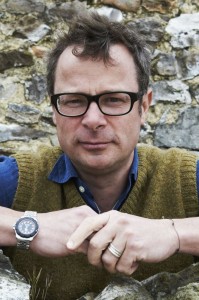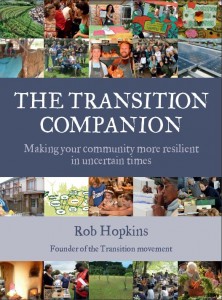25 Oct 2011
Hugh Fearnley-Whittingstall’s foreword to ‘The Transition Companion’
 Thursday is the proper launch date for The Transition Companion, and some other exciting new developments will be unveiled on Thursday too. You’re going to love them. In the meantime, here is the wonderful foreword for the book written by Hugh Fearnley-Whittingstall.
Thursday is the proper launch date for The Transition Companion, and some other exciting new developments will be unveiled on Thursday too. You’re going to love them. In the meantime, here is the wonderful foreword for the book written by Hugh Fearnley-Whittingstall.
“Observing the growth of the Transition movement over the past five years has been inspiring in so many ways. While governments and big business struggle (to put it politely) to tackle the enormous environmental issues that face us, this movement has forged ahead with its collective bid to find a creative, passionate response to the question ‘where do we go from here?’
Spreading outwards from its inception in the towns of Kinsale and Totnes, Transition has become a remarkable network with global reach. There are now practical projects under way on the ground all over the UK, and beyond. They demonstrate beyond doubt that the strengthening and diversification of local economies, underpinned by a commitment not to squander the Earth’s finite resources, is a highly effective strategy for the uncertain times we live in. They help take the fear out of the future, while offering people a renewed sense of belonging; of shared experience and goals; of a life that makes sense again.
 Four years after the publication of The Transition Handbook, Rob Hopkins has now completed this second volume. The former explored the theory of Transition, and asked what an international movement based on it might look like. This new book draws on five years of practical experience that go a long way towards answering that question. Here, Rob sets out an exciting, much-expanded idea of what Transition is and could become; one that is rich with hard-won insights and practical advice. It’s a work full of bold answers, inspirational ideas and daring solutions. Although profoundly serious at heart, it’s never sombre. In fact, it’s a great deal of fun, frequently demonstrating how Transition is a highly creative, stimulating and even playful process.
Four years after the publication of The Transition Handbook, Rob Hopkins has now completed this second volume. The former explored the theory of Transition, and asked what an international movement based on it might look like. This new book draws on five years of practical experience that go a long way towards answering that question. Here, Rob sets out an exciting, much-expanded idea of what Transition is and could become; one that is rich with hard-won insights and practical advice. It’s a work full of bold answers, inspirational ideas and daring solutions. Although profoundly serious at heart, it’s never sombre. In fact, it’s a great deal of fun, frequently demonstrating how Transition is a highly creative, stimulating and even playful process.
I am struck by the way Rob describes each Transition undertaking as unique – like the community in which it thrives. While always rooted in a set of crucial principles, every example will reflect the specific needs and qualities of an individual place. It’s rather like giving a great cake recipe to a dozen different cooks and watching how their particular ingredients, techniques and creative ideas produce subtly different results. Rob argues that a Transition community never will, or should, look quite the same twice – and in that flexibility lies the strength of this movement. He makes the wholly convincing point that community strategies to tackle peak oil, climate change and all the other pressing environmental issues that face us should emerge organically from the community itself, rather than being imposed from the top down. It’s a vital insight of the movement that this kind of bottom-up process is far more likely to result in real change that is rooted in local knowledge, creativity and passion. It’s what gives Transition its enduring resonance and relevance.
My first experience of Transition came in 2008, when I travelled to Totnes to film a sequence about Garden Share, a project that matched people who wanted to grow food but had nowhere to do it with people who had unused or under-used gardens around the town. It was a brilliantly simple initiative, and above all a practical one that was getting a great response. It inspired me, and colleagues from the production company, to set up our online Landshare scheme, which aims to match would-be growers with land and garden ‘donors’ all over the country. There’s no question that we owe the success of Landshare to that inspiring day I spent in Totnes, among Transition pioneers.
Pretty much everything I do, as a writer and broadcaster, is predicated on the idea that families and communities can gain huge pleasure and satisfaction from taking more responsibility for the food they eat, and sourcing it closer to home. Rob holds to the same faith, expanding this nourishing self- and community-reliance to all aspects of our lives. His view is that an extraordinary and historic shift in how this country feeds, powers and houses itself is on the horizon, and we can all play a part in it. It will be a shift, or transition, that future generations will remember and celebrate.
The practical aspects of this – the solar panels, the vegetable beds, the low-carbon buildings – are the easy bit. As Rob says, “If we wait for the governments, it’ll be too little, too late; if we act as individuals, it’ll be too little; but if we act as communities, it might just be enough, just in time.” It is the working together, rediscovering how to build community and to support each other, that is the harder thing to get right. That is where The Transition Companion comes in. It offers an extraordinarily rich yet highly accessible model for drawing together the people around you, and describes the tools needed to start an economic and social renaissance in the place you live. It’s a book that is unashamedly ambitious and far-reaching in its scope and vision. But, if we are to successfully navigate what’s coming towards us, and hold on to our identity, our community and our shared optimism for the future, that is exactly what we need.
Hugh Fearnley-Whittingstall, River Cottage, May 2011
To find out more about Hugh’s latest project, energyshare, click here.
Jan
25 Oct 8:10am
great stuff, Rob, so wish I could be with you for the Official Launch on Thurs – just how many launches does this ship have? but I’ve been delayed in Crete (grateful thanxxx to striking air traffic controllers). There is so much thought and debate going on here about all this….I brought a copy of TTC as a present for Julia Jones (who runs a wonderful charity “Flowers of Crete”) & it’s already going the rounds…..it was especially interesting to the people at OAC, the Orthodox Academy of Crete, in Kolymbari, as they initiated a 30 year plan for the whole of Crete in 1990. They’d never heard of Transition, nor Schumacher, and I’d never heard of the Green Patriarch!! Overlapping worlds with much in common and to discuss….the Green Patriarch of the Greek Orthodox Church has 36 million followers worldwide, he’s been Patriarch for about 20 years & is a passionate environmentalist, very early on he declared harming the earth to be a sin…which means GOChristians need to confess their actions & ask for forgiveness…
Anyway, I could enthuse for ever about this enchanting island, but just a quickie to finish…I’ve exchanged a Totnes Pound here for 1 Euro, so we’re now an international currency!
Solar Panels Are Easy, Cooperation is Hard: Hugh Fearnley Whittingstall on the Challenge of Transition | Social Entrepreneur Guide
27 Oct 2:54pm
[…] to a more connected food system. But food is just one part of the puzzle. And he has just written a foreword to the new Transition Companion book, arguing that we need to reengage and reinvigorate almost every aspect of our […]
Alex Hallatt
31 Oct 4:08am
This will be one of the first things I’ll be buying for my move back to Europe, unless I’m lucky enough to end up in a transition town like Totnes.